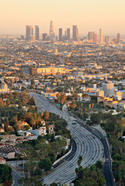Newgeography.com - Economic, demographic, and political commentary about places
Next week, Antonio Villaraigosa will be overwhelmingly re-elected mayor of Los Angeles. Do not, however, take the size of his margin – he faces no significant opposition – as evidence that all is well in the city of angels.
Whatever His Honor says to the media, the sad reality remains that Los Angeles has fallen into a serious secular decline. This constitutes one of the most rapid – and largely unnecessary – municipal reversals in fortune in American urban history. read more »
by Anonymous 02/22/2009
It was during the inaugural days that an article appeared in The Washington Post about the predominantly black Mississippi Delta going for Obama – no surprise! But juxtaposed in the same time period there appeared in a Kentucky newspaper the story of predominantly white Menifee County, my birthplace – deep in the heart of Appalachia – defying the red sea of Kentucky all around it and also going for Obama. read more »
For decades, California has epitomized America's economic strengths: technological excellence, artistic creativity, agricultural fecundity and an intrepid entrepreneurial spirit. Yet lately California has projected a grimmer vision of a politically divided, economically stagnant state. Last week its legislature cut a deal to close its $42 billion budget deficit, but its larger problems remain. read more »
I was laying in bed this morning, listening to discussions of the Homeowner Affordability and Stability Plan, the 2009 version of a Homeowner Bailout. (The 2008 version was spent on the banks.) I listened closely because I had to decide if it was worth getting out of bed to earn the money to pay my mortgage or not. Like all those bankers that got a bailout, I was wondering if it might be worth more to me to default on my mortgage than to pay it. read more »
This month, a new report from The Center For An Urban Future, Reviving The City of Aspiration, examines the squeeze on middle class New Yorkers.
The struggle to afford life’s basics—and a few indulgences, too—is nothing new to urbanites of modest means. A 1907 New York Times piece headlined 'Very Soon New York Will Be A City Without Resident Citizens' reported, “Life in the big city is becoming impossible to the average householder, living on an average income.” ‘Average’ necessities were identified as rent, home-cooked meals, servants wages, ice, and coal. Occasional luxuries included theater and restaurant visits. read more »
The great housing turndown, which started as early as 2007, has entered a second and more difficult phase. We can trace this to Monday, September 15, 2008 just as October 29, 1929 – “Black Tuesday” – marked the start of the Great Depression. September 15 does not yet have a name and the name “Black Monday” has already been taken by the 1987 stock market crash. The 1987 crash looks in historical perspective like a slight downturn compared to what the world faces today.
On September 15 – let’s call it “Meltdown Monday” – the housing downturn ended its Phase I and burst into financial markets leading to the most serious global recession since the Great Depression. Indeed, International Monetary Fund head Dominique Strauss-Kahn now classifies it a depression. read more »
There is something about Oregon that ignites something close to poetic inspiration, even among the most level-headed types. When I asked Hank Hoell recently about the state, he waxed on about hiking the spectacular Cascades, the dreamy coastal towns and the rich farmlands of the green Willamette Valley.
"Oregon," enthused Hoell, president of LibertyBank, the state's largest privately owned bank, from his office in Eugene, "is America's best-kept secret. If quality of life matters at all, Oregon has it in spades. It is as good as it gets. It's just superb." read more »
I keep hearing how the current recession will end in 2010 because the average United States recession from 1854 to 2001 has been 17 months. This is silly for a variety of reasons.
One reason is that there is no average recession. Post-World War II recessions have lasted from a minimum of six months to a maximum of only 16 months. If we were to apply the “average recession” logic to post World War II recessions, the current recession, which the NBER — the National Bureau of Economic Research — says started December 2007, would have ended 10 months later, last October. read more »
by Anonymous 02/15/2009
The assonant phrase “Dubai, Mumbai, Shanghai or Goodbye” was credited to Andrew Ross Sorkin of the New York Times in late 2007 at the beginning of the financial crisis on Wall Street. For years, New York, London and Tokyo held sway as the world’s financial capitals. Then the tectonic plates of the financial world began to move and these new cities were going to be the prime beneficiaries. read more »
|






















